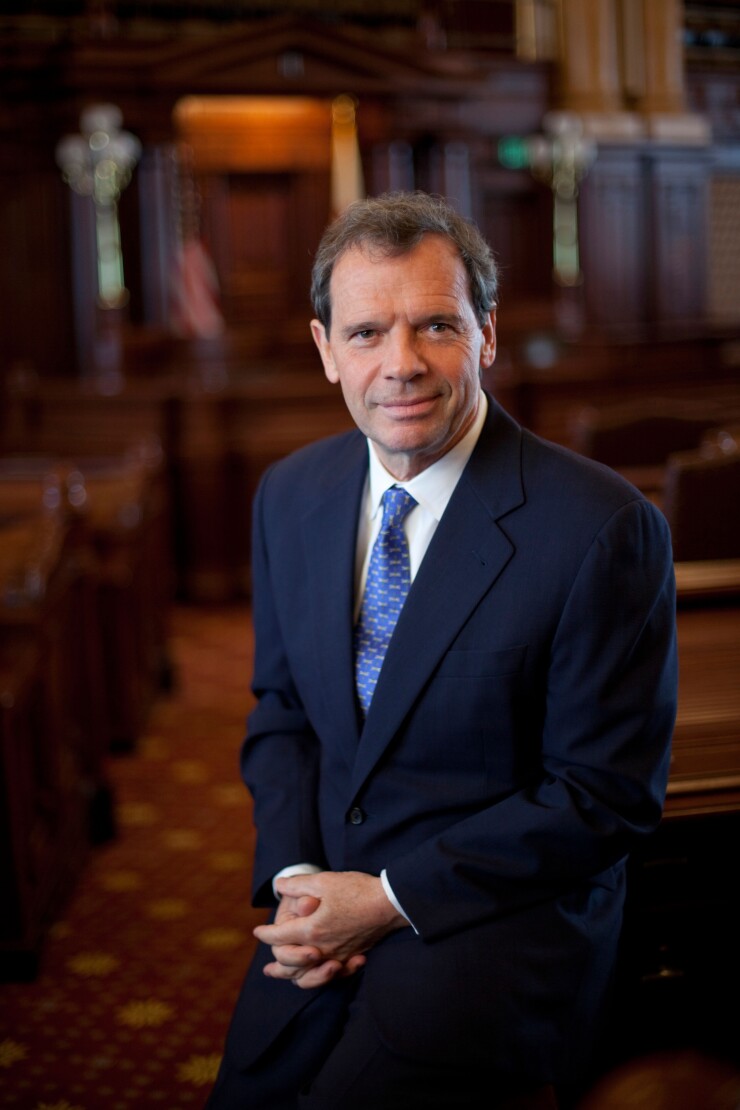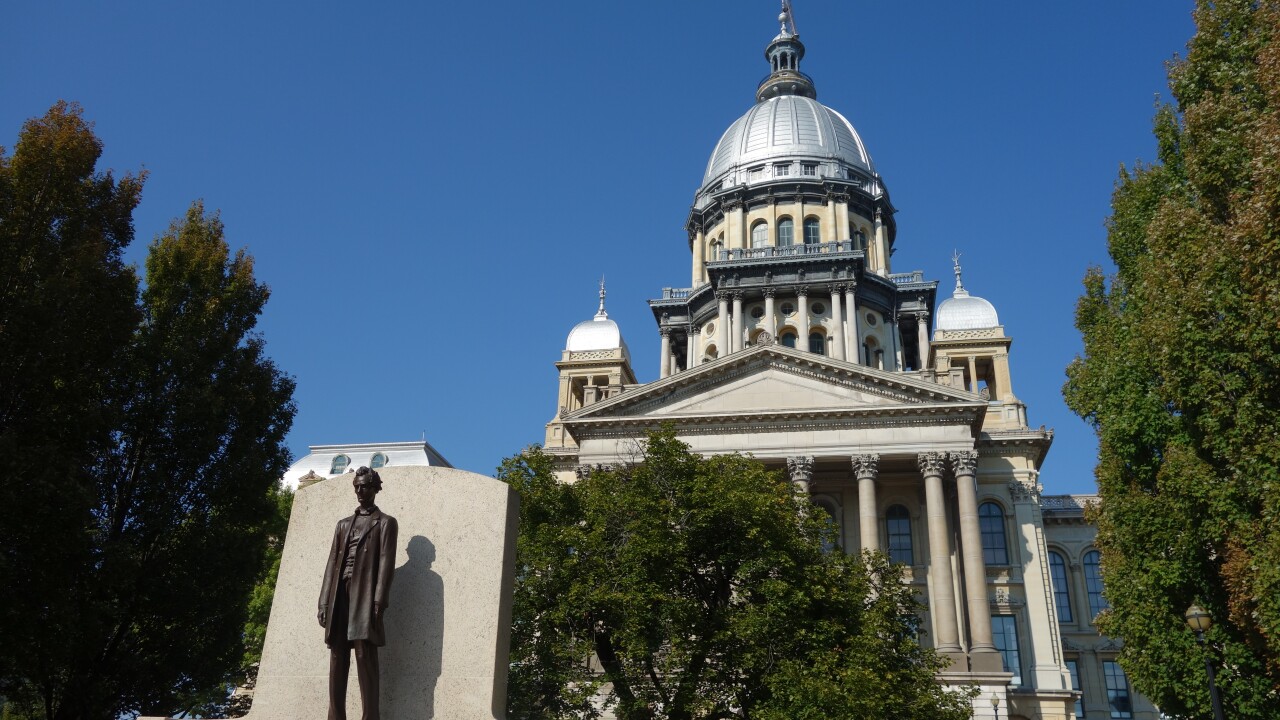CHICAGO – The Illinois Senate’s top Democrat warned Gov. Bruce Rauner he sees little room left for additional concessions on his budget and policy demands while “disaster” looms if new revenue sources aren’t approved by the end of the month.
Senate President John Cullerton’s comments came as remaining disagreements over pieces of a bipartisan Senate budget-and-policy package held up voting on Wednesday.

“What’s at stake here is that we have enormous debt and if we don’t pass revenue before the end of the month it will be very difficult to pass it before the end of the year, and it will be very difficult to pass it next year, in an election year, and we will owe $24 billion according to the governor on election day” in 2018, the Chicago Democrat said.
“We will have hit junk bond status, maybe by the end of the month, if we don’t do this,” Cullerton said. After May 31, the simple majority needed to pass bills that take effect immediately rises to a three-fifths majority.
The budget stalemate between Rauner and the General Assembly’s Democratic majorities is headed toward the two year mark. The state is spending about $7.5 billion more annually than the $31.5 billion it collects, Cullerton said.
That’s due to continuing appropriations, legal mandates and various piecemeal appropriations approved over the last two years.
The state’s cash flow is growing more precarious as the bill backlog nears the $13 billion leaving even those with appropriations in place like school districts, public colleges, and transit agencies starved for cash.
Cullerton’s comments stemmed from what he described as his frustrations that final agreements have faltered despite recent meetings with the governor and Republicans leaving the so-called “grand bargain” budget package still in limbo. Cullerton is a co-author of the package with Republican Minority Leader Christine Radogno, R-Lemont.
The package introduced earlier this year would authorize spending from Jan 1 through June 30, raise income tax rates, authorize short-term borrowing, expand gambling, allow for local government consolidation and procurement changes, temporarily freeze local property taxes and make some changes to worker’s compensation. All are linked so no one bill can take effect unless all pass.
Democrats and Republicans remain at loggerheads over a few issues including the length of a local property tax freeze, the tax hike package, and the worker’s compensation changes. Radogno said the two sides are close on a cash flow borrowing and school funding overhaul. A final deal on revenue and spending in the fiscal 2018 budget which is not part of the ‘grand bargain’ package but an issue in negotiations also remains a sticking point.
Democrats blame Rauner for pressuring Republicans to withhold their support because the reforms still fall short of his demands. Rauner is pushing for a match between the local property tax freeze and the term of any income tax hike as well as well as billions in spending cuts to support about $5 billion in new revenue. Democrats so far are willing to support only a two-year freeze.
Cullerton headed into the Wednesday session with plans to call several bills although it was expected Radogno would hold her worker’s compensation and property tax freeze bills. Only the Cullerton-sponsored Senate Bill 10, which provides a new borrowing avenue for local home rule units of government, was called for a vote.
Democrats who hold a supermajority passed the bill 35-to-15 and then passed a second stand-alone version SB41 in a 38-to-12 vote that can be sent to the House for consideration without passage of the full “grand bargain” legislation.
The bill allows home rule units of government to leverage various state-supplied revenue from sales taxes or local government aid and gambling revenue by dedicating a portion to a special entity and using it to secure bonds.
“It is meant to allow the home rule units to get lower interest rates, save money…and it doesn’t cost any money for the state,” Cullerton said.
Cullerton defended his decision to try to move the package without a final deal because the clock is ticking and time is needed to get the package through the House, where it’s unclear whether House Speaker Michael Madigan, D-Chicago, will support it. Lawmakers also must then tackle a fiscal 2018 budget.
Cullerton warned there’s little room left for his caucus to compromise on the sticking points without losing needed votes. “We believe we’ve just about exhausted those efforts to compromise on the reforms,” Cullerton warned.
He offered a stinging assessment of Rauner’s leadership.
“These guys don’t know how to govern, they haven’t had a lot of practice and at some point in time you have to just agree, ok, let’s make a deal and understand the other side and understand how far they can go,” he said.
Radogno said on the Senate floor she understood the “frustration” and “sense of urgency” but still supports moving “everything as a package at once” when an agreement is reached.
At a news conference later, Radogno and Sen. Bill Brady, R-Bloomington, who is leading fiscal 2018 budget talks, said they remain committed to negotiations and believe an accord can be reached soon.
“The consequences are so severe” and it would take the state “years and years” to recover if the impasses isn’t resolved before the session ends, Radogno said.
All three rating agencies rate the state at the Baa2/BBB level and have issued specific warnings that without action in the coming months further credit deterioration lies ahead with the state’s investment grade status at risk. A two-notch fall would give the state the unwelcome distinction of being the first junk-rated state.
If negotiations fail on the “grand bargain” and on the fiscal 2018 budget, the Senate is expected to consider an $800 million plan dubbed a “lifeline” appropriation by the House which approved it last month. It provides funding for social service vendors and higher education. It could be expanded.
Rauner has said he doesn’t want another stopgap plan like the one approved a year ago that covered spending from July 1 through December but pressure will be on all to approve kindergarten through 12th grade funding. The stopgap at the start of 2017 but K-12 received a full year’s worth of funding.





